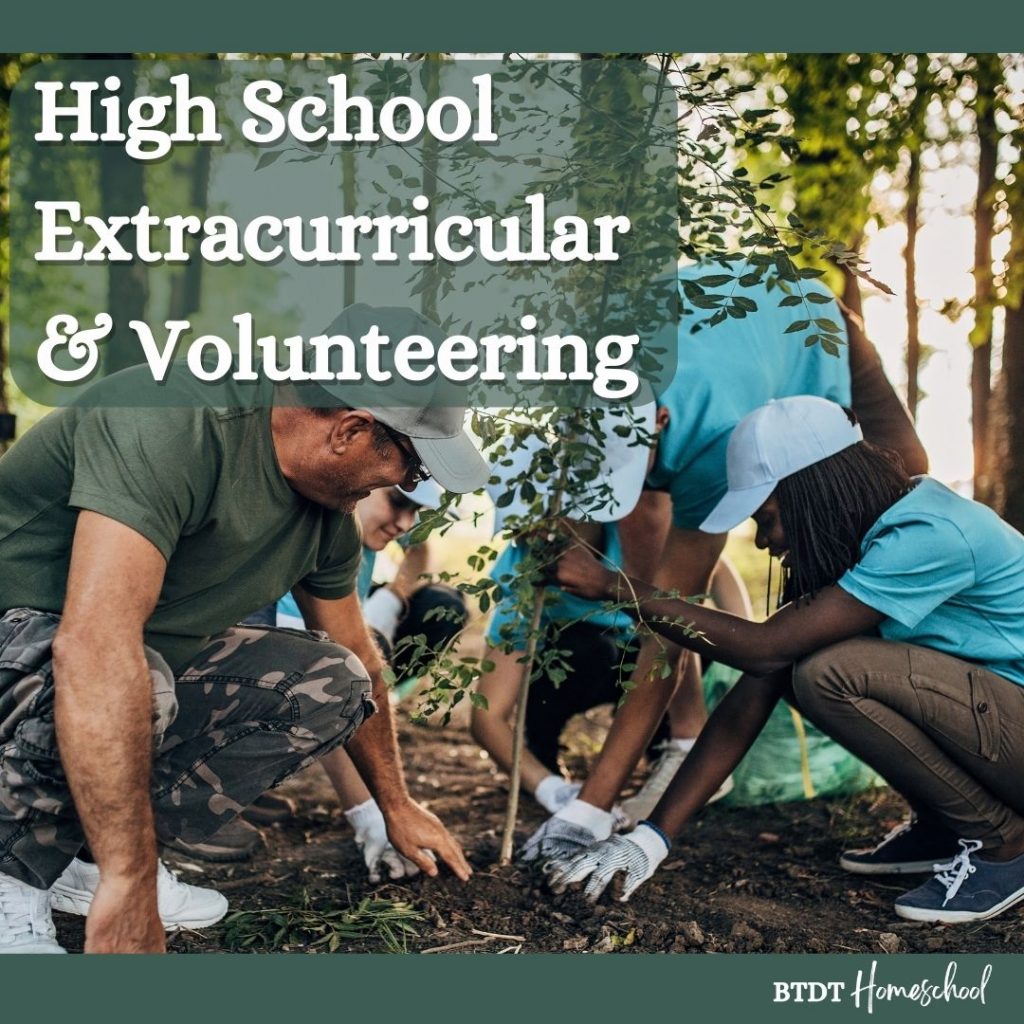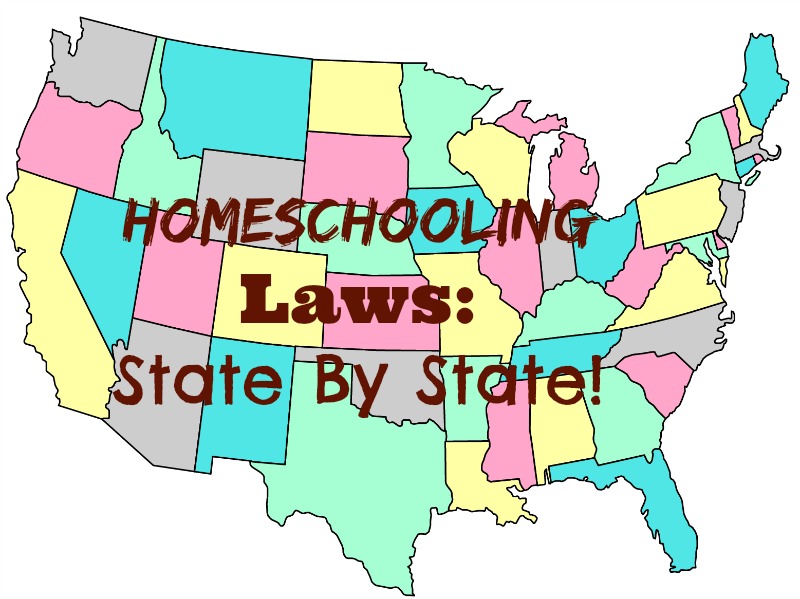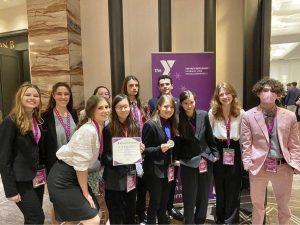040. Homeschool Extracurricular & Volunteering


Extracurricular
& Volunteering
Adding extracurricular and volunteer hours isn’t only fun, it helps create diverse and interesting students and makes them stand out on college applications and job interviews.
* Should extracurricular activities go on the transcript
* How many volunteer hours should a high schooler do?
* Do hobbies count as extracurricular subjects?
Today, we will be answering these questions and more!!

Episode 040:
TWO WAYS TO LISTEN TO THIS EPISODE:
1. Click PLAY Button Above ^^ to listen here.
2. OR Listen on your favorite podcast platform:
Scroll down for this week’s FREEBIE:
Extracurricular Workbook (pdf)
Brand New to Homeschooling?
GETTING START PAGE >>
Kindergarten Page >>
High School Series >>
Show Notes
If your student is college bound, you have probably spent a lot of time agonizing over putting together a transcript of robust classes and grades so that you can showcase the rigor and variety of education experience your child has been busy with. But colleges and universities are not only interested in academics, but they also want to see well-rounded applicants who participate in a variety of activities and are active members in their community. Admissions staff are often looking for students who understand how to build into a community because this can help build good college culture. Colleges like to know that homeschool high schoolers are not just sitting at home but know how to contribute to the world around them. There are all kinds of ways to build that “Total College Package” that will make your student a super desirable candidate. Volunteering and participating in a variety of extracurricular activities not only helps build good character, but they build great transcripts too!
Get your FREE transcript templates>>
But remember there’s only one absolute must in all of this. And that is to follow your state homeschool law. There are plenty of kids that get into college that were homeschooled without this extra, but it definitely helps you stand out. It’s also important to check the college requirements and put those into your plan. But beyond that, everything you do is your choice.

And even if your child is not college bound, participating in extracurriculars and community service is still an excellent way to figure out their future path and to contribute to society. So don’t discount this important step of their educational journey. It will help create memories that these homeschool graduates can talk about in job interviews, too. Interviews often start with “Tell me about yourself”. Your new graduate that may not be college-bound will have plenty to talk about!
But there are so many more reasons to participate in these activities.
Skill Development:
These opportunities will help your teenager develop a wide range of skills beyond what is taught in the classroom. These activities can help enhance their leadership, teamwork, communication and time management skills. It also helps them home in on those critical thinking and problem-solving skills.
- College Applications: Participating in extracurricular activities and volunteer work can significantly strengthen your college applications. Admissions officers often look for well-rounded applicants who have demonstrated their commitment and passion outside of academics. Your involvement in such activities can make you stand out from other applicants and showcase your dedication and interests.
- Personal Growth: Extracurricular activities and volunteering offer opportunities for personal growth and self-discovery. Your high schooler can explore their interests, passions, and talents. These things are going to allow them to develop a sense of identity and purpose. These experiences can also help build their confidence. It really doesn’t matter what kind of extracurricular activities your kids choose to do, there are so many options, and each one is going to help them to develop resilience and learn to be adaptable – these are all really important qualities for success in life.
- Networking: Participating in extracurricular activities and volunteering can help you expand your social network. You’ll meet people with similar interests, make new friends, and connect with mentors who can provide guidance and support. Networking is valuable not only during high school but also in college and beyond, as these connections can lead to future opportunities.
- Community Engagement: We have always made volunteering a big part of our homeschool. Volunteering allows your kids to give back to the community and make a positive impact on others’ lives. Volunteering cultivates empathy and compassion. It also gives you a sense of social responsibility, it exposes them to different social issues. These kinds of experiences really help our kids to understand the world beyond their immediate surroundings.
- Exploration of Interests and Passions: Extracurricular activities provide a platform to explore and pursue your passions. Whether it’s joining a sports team, participating in a debate club, or engaging in artistic endeavors, these activities allow you to discover what you truly enjoy and what you may want to pursue further in the future.
- Stress Relief and Balance: High school can be academically demanding and stressful. When our kids are involved in extracurricular activities and volunteering, it can provide a much-needed break and serve as a healthy outlet for relieving their stress. It can help create a balance between academics and other aspects of life, and it gives them a sense of overall well-being.
Remember, it’s important to choose activities that genuinely interest you and align with your values. Quality matters more than quantity, so focus on a few activities that you’re genuinely passionate about and commit to them wholeheartedly.
How many volunteer hours should a high schooler do? (10:13)
This number of volunteer hours that highschoolers do varies depending on their personal goals and how much time they have available. While there is no specific requirement, many aim to complete between 50 and 200 volunteer hours. A general guide is to aim for 10–15 hours per month during the school year, and as much as possible over the summer. Remember, there’s no specific number but it’s a good idea to shoot for enough to gain valuable experiences and make a positive impact.
Here are a few factors to consider:
- Personal Interest: Engage in volunteer activities that align with your interests and passions. Choose causes or organizations that resonate with you and where you believe you can contribute meaningfully. When you are genuinely interested in the work you’re doing, you are more likely to commit and enjoy the experience.
- Time Availability: Consider your academic workload, extracurricular commitments, and other responsibilities when determining the number of volunteer hours you can realistically dedicate. Is your student working to try to save up for a car? That may be 20 hours a week really cutting into their free time for volunteering. It’s important to strike a balance with all your commitments while maintaining their academic performance and overall well-being.
- Requirements and Recommendations: Some schools, scholarships, or programs may have specific requirements or recommendations for volunteer hours. It’s advisable to check with your school’s guidance counselor or college admissions offices to see if there are any guidelines to follow. However, keep in mind that the quality of your volunteer experiences is generally more important than the sheer number of hours.
- Consistency and Longevity: Rather than focusing solely on the number of hours, consider the consistency and longevity of your volunteer commitment. Demonstrating long-term dedication to a cause or organization can be more impactful than sporadic involvement. It shows commitment, responsibility, and a deeper understanding of the cause you’re supporting.
Ultimately, the goal of volunteering is to make a positive impact and gain valuable experiences, so it’s more important to focus on the quality of your volunteer work rather than getting caught up in meeting a specific hour quota.
Should extracurricular activities go on the transcript? (13:26)
So while you definitely want to include extracurricular activities with your application materials, the transcript is typically not the place for it. You want to keep academic achievements and coursework as essential components of a transcript, while extracurricular activities highlight their involvement, skills achieved, and interests beyond the classroom. These activities go on a resume or a second page or often, there is a space on the school application, or Common App where you can list all of this information. Including this information can give colleges, universities, or future employers a well-rounded view of your abilities, dedication, and character.
High School Documentation Episode>>
When listing extracurricular activities on your resume or in your application documentation, consider providing the following details for each activity:
- Name of the activity: Clearly state the name of the extracurricular activity.
- Duration: Specify the period during which they participated in the activity (e.g., years or semesters).
- Role or position: Indicate any leadership positions or significant responsibilities they held within the activity.
- Description: Briefly describe the nature of the activity and their involvement. Highlight any notable achievements, awards, or recognition they received.
Remember, the goal is to provide a well-rounded picture of your high school experience, so focus on including activities that demonstrate your skills and passions! Examples of extracurricular activities you may want to include are sports, clubs, community service, volunteering, music or arts-related activities, leadership positions, part-time jobs, internships, or any other relevant activities. All of these can help you stand out and showcase your holistic development and commitment beyond academics.
Do hobbies count as extracurricular subjects? (15:46)
So while hobbies may not typically fall under the traditional definition of extracurricular activities, they can still provide valuable insights into your interests, skills, and personal development. Especially if your hobbies are particularly relevant to your field of study or demonstrate important qualities, it may be worth considering including them.
Download the ENTIRE list of 105 activities >>
Maybe they align with their academic interests or showcase skills that are transferable or applicable to their desired path? Have their hobbies had a significant impact on their personal growth, character development, or community involvement? If their hobbies have led to noteworthy achievements or contributions, they can and should be mentioned. It’s essential to maintain a balance and focus on including activities that provide the most comprehensive and compelling representation of your abilities, interests, and accomplishments.
Many people worry about extracurriculars because maybe they have a kid who isn’t sporty or particularly artsy or crafty. That’s ok! There are so many different avenues for extracurriculars and there are few rules about what counts. It’s your homeschool- you decide what is important and worthy.

Perfect hobby for a musician!
Sports
The first thing that typically comes to people’s minds are sports. And just because your student is homeschooled doesn’t mean they don’t have opportunities for team and individual sports. While in some places homeschooled kids can participate with local school teams, in other areas support groups have formed homeschool teams in basketball, soccer, baseball, volleyball, track and field, swimming, tennis, martial arts, dance, cheer, and more. There are also independent teams- rec and club level in many communities that offer these same services.


Group Activities
Personal interest clubs – Dungeons & Dragons, board game club, programming club, engineering club. My son was a member of the Texas Robot combat club for a few years and built combat robots from the design and a CAD program to 3-D printing, the chassis to mounting the servo and programming the remote and weapon. He actually won a couple of really cool competitions.
Government groups/Speech & Debate:
Model United Nations (MUN) is an educational simulation activity in which students role-play as delegates to the United Nations (UN) and simulate UN committees or other international bodies. MUN aims to provide participants with an understanding of international relations, diplomacy, and the workings of the UN. During a Model UN conference, students represent different countries or entities and engage in debates and discussions on global issues. They research their assigned country’s policies, they prepare position papers, and engage in negotiations with other delegates to find solutions to complex problems. Participants must articulate their country’s positions, negotiate with other delegates, and draft resolutions that address the issues being discussed.
Model United Nations: https://www.un.org/en/mun

Resolution: Water Desalinization…PASSED!
In a Youth and Government program, participants take on roles such as legislators, judges, lobbyists, journalists, or executive branch officials. They simulate the functions of government bodies, such as the state legislature, judiciary, or executive branch, and work together to propose, debate, and enact legislation, make judicial decisions, or carry out executive functions. The program aims to provide young people with firsthand experience in how the government operates, and it helps foster a deeper understanding of democracy, civic engagement, and public policy. Participants gain insights into the legislative process, develop critical thinking and public speaking skills, learn about policy issues, and engage in debate and negotiation.
Youth and Government: https://www.ymca.org/what-we-do/youth-development/education-leadership/government

These gave our kids “student council” experience, too, which they went on to use in college on their university student council groups or sorority/panhellenic leadership.

Robert’s Rules of Order is a book that outlines the rules of parliamentary procedure. It is used by many organizations to help them conduct their meetings in an orderly fashion. The book is useful for youth organizations as it can help them learn how to run meetings for their clubs or organizations.
Academic competitions
Participating in academic competitions, such as mathletes, science fairs, and opportunities include Jr. Achievement, Scholastic Bowl or National Quiz Bowl, Math and Spelling Bees, and Odyssey of the Mind competitions, or speech and debate tournaments can challenge and showcase a student’s knowledge and skills in specific subjects.
Odyssey of the Mind: https://www.odysseyofthemind.com
Destination Imagination: https://www.destinationimagination.org
Shakespeare Competition: https://www.esuus.org/esu/programs/shakespeare_competition/about/
Poetry Out Loud: https://www.poetryoutloud.org
National Quiz Bowl: https://www.naqt.com/about/quiz-bowl.html
Mathletes: https://mathleteschallenge.com
Spelling Bee: https://spellingbee.com/faq/how-do-i-enroll-if-there-no-home-school-associationgroupco-op-my-area
Speech and Debate: https://www.speechanddebate.org/nationals/
Junior Achievement: https://jausa.ja.org
4-H Groups
High-school students can form 4 H clubs in your homeschool group. Your children can raise livestock, collect insects, decorate cakes, or learn woodworking. There are literally hundreds of projects for children to try. They can compete at the county fair with their annual project. Parents are closely involved with the whole process. Leadership is carefully taught as each club is run by the children using “Robert’s Rules of Order.” Only children vote in these meetings.
4-H: https://4-h.org
At our recent homeschool expo I met the guy who runs the lone Texas 4 H Center- just 1! In Georgia we had several and they are worth the trip. 4 H is an awesome organization and they often will do group events for a very small group- like 10 people. That can be 3 homeschool families!
Texas 4-H: https://texas4hcenter.tamu.edu
Georgia 4-H: https://georgia4h.org/4-h-centers/
Scouting
Scouting can be a great source of leadership training. Merit badges include excellent units of study and mastery to add to your curriculum. An Eagle Scout for boy scouts is an amazing accomplishment and girl scouts have the Gold Award which is a prestigious honor that recognizes exceptional leadership, project management, and commitment to making a sustainable and positive impact in their community. Similar to the Eagle Scout rank, earning the Gold Award requires a Girl Scout to complete a series of requirements, including identifying a community issue, developing a project plan, gaining necessary approvals, implementing the project, and measuring its impact. It also involves demonstrating leadership skills, engaging with community members, and dedicating a significant amount of time and effort to the project.
BSA also offers Venture Scouting. This is a great option for teenagers that have never been involved in scouts or are continuing on. It is a co-ed program for young men and women aged 14-20. It focuses on adventure, leadership, and personal development through activities such as outdoor adventures, community service, and skill-building. And they offer Sea Scouts as a program that emphasizes nautical skills and water-based activities. It offers opportunities for young men and women aged 14-20 to learn about sailing, boating, and water safety while fostering leadership and teamwork.
Girl Scouts https://www.girlscouts.org
Boy Scouts: https://www.scouting.org
Navigators: https://www.navigatorsusa.org
Sea Scouts: https://seascout.org
Venturing Scouts: https://www.scouting.org/programs/venturing/
My daughter’s Venturing Scout Troop backpacking for 10 days in the Arizona Mountains:

Civil Air Patrol
If your teenager enjoys the thought of helping others, wearing a uniform, and flying airplanes, then the Civil Air Patrol Cadet Program might be a good fit for them. This is an auxiliary organization of the U.S. Air Force. Cadets learn aeronautics, aviation, military drills, marching, survival skills, and first aid skills. Uniforms, gear, and equipment are included at no additional charge. Cadets are promoted on their own merits through testing and achievement.
Civil Air Patrol: https://www.gocivilairpatrol.com
I did this when I was in high school. I was also part of an emergency services department as a ham radio operator. I went out on calls and would do things like communicate with 911 and direct traffic. It was an arm of our county sheriff’s department. Check and see if your city has a similar program.
Community Programs and Classes, fine arts
Your student may enjoy being a part of a theater production or orchestra. One of our kids is a musician, and took lessons and performed with School or Rock for years. He has since moved onto classical guitar, but it was a good stepping stone for him to get in front of an audience and learn stage performance. He wants to pursue music, and he loves jazz and classical music so he performs weekly at an open mic night here in North Texas. And he started to teach guitar to younger students. Some of our kids are fiddle players.
School of Irish Music: http://schoolofirishmusic.org
School of Rock: https://www.schoolofrock.com

Check your local recreation center catalog for a variety of classes. Fitness groups like Crossfit or a weightlifting class can be great, too.
Book Discussion Groups
Many homeschool students form book discussion groups. Book selection can be made by the students, with parental input. This gives the students a chance to learn more about “give and take” or Socratic discussion, public speaking, and how to defend their position in a non-threatening atmosphere.
Community Service
There are many ways teens can become involved in serving their community, such as hospital volunteer work, helping at an animal shelter, visiting a nursing home, doing yard work for an elderly neighbor, reading to neighborhood children, etc.
They can get great experience working on a political campaign. We canvassed for a very popular senate election a few years ago. Kids as young as 15 can be poll officials in our county election office. During the 2020 presidential election the most experienced clerk was actually a young man in his 20s who had started working there in high school as a teen.
Journalism and publications: Students can create or join in a school newspaper, join a yearbook committee, or literary magazine, where they can develop their writing, editing, and design skills.
Leadership programs: Leadership programs such as Junior ROTC, National Honor Society, or leadership clubs provide opportunities to develop leadership abilities and contribute to the school community.
ROTC: https://www.usarmyjrotc.com
National Honor Society: https://www.nationalhonorsociety.org
Entrepreneurship or business clubs: Students interested in business and entrepreneurship can participate in clubs that focus on developing entrepreneurial skills, organizing business competitions, or engaging in fundraising activities.
Apprenticeships or Internships or part time jobs
Activities abound, but don’t overlook the unique opportunity you have to involve your teens in your adult life! Do you own a business? Train them to be your assistant. Are you a craftsman? Take on an apprentice! Our lovely podcast jingle was written and recorded by my lovely 16-year-old apprentice. Students can seek internships or part-time jobs in fields related to their interests or career goals, gaining practical experience and skills. Like I talked about my son teaching guitar lessons.
So hopefully, if you aren’t already encouraging your child to explore extracurriculars and community service, we gave you some ideas of where to start! These are the kinds of activities and experiences which really stay with you your entire life and have so many benefits all around.
This Week’s Freebie:
















